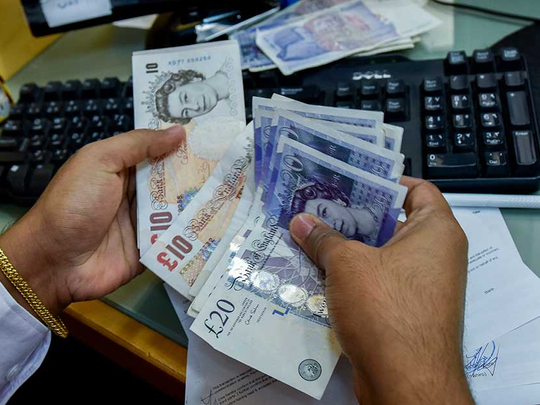
Abu Dhabi: The recent plunge in the British pound is expected to take a toll on the UAE’s economy — more so than on the economy of any other country of the Gulf Cooperation Council (GCC), especially in sectors such as tourism and real estate, analysts agreed.
While the pound had been relatively stable in much of the third quarter of 2016, it plunged 6.5 per cent in the first 10 days of October, with the currency now down by more than 17.43 per cent versus the dollar for the year.
With the UAE’s currency being pegged to the US dollar, which has been strengthening lately, the plunge in the pound is only exacerbated.
“Within the GCC, we expect the UAE to see the greatest impact of the sharply weaker outlook for the British pound and the euro. The UAE has been the most affected by the recent strengthening in the US dollar given its greater diversification.
The general upward trend for the dollar will impact tourism from other non-USD linked economies … We see the sharp weakening in the British pound contributing to the softer private consumption investment outlook in the UAE,” said Monica Malik, chief economist at Abu Dhabi Commercial Bank (ADCB).
For the UAE’s tourism sector, which is a key driver of consumption and non-oil gross domestic product, the UK is a key market (one of the largest guest markets, in fact).
ADCB’s Malik said she expected a “marked deterioration” in tourism numbers and expenditure from UK visitors.
“UK visitors were the third largest source of tourism to Dubai in the first quarter of 2016, accounting for eight per cent of the total. UK citizens were also the third largest group of hotel visitors to Abu Dhabi in Q1 2016 — excluding UAE nationals — with growth of six per cent year-on-year.
Western Europe (including the UK) was the second largest source of tourists to Dubai by region, accounting for 23 per cent in Q1 2016. This is significant if the Brexit vote results in a worsening of the Eurozone crisis,” Malik told Gulf News by email.
Within the UAE, the impact may be stronger for hotels in Dubai compared to those in other emirates as Dubai is one of the primary destinations in the region for British travellers, according to Rashid Aboobacker, associate director at TRI Consulting.
However, that is not to say that Dubai won’t be relatively attractive for British tourists.
“We believe the impact of currency fluctuations will be short term, and for the UK to remain a major tourism source market to the UAE in the long term despite the current crisis.
In addition to the UAE’s location within a few hours’ flight, year-long sunshine, and variety of quality tourism offerings, the country is home to a large expatriate British population, which brings a lot of families and friends here throughout the year,” Aboobacker said.
But it’s not just the tourism sector where the echoes of a weaker sterling will be heard. The impact of fewer British tourists will also spill over into the retail sector, for one. Euromonitor International, a research firm, revised its growth outlook for the UAE’s retail sector for the year, reducing it to 4.3 per cent from 4.8 per cent on the back of the Brexit.
Additionally, a weaker pound versus a stronger dollar (and hence, stronger dirham) will make property in the UAE less attractive for British investors.
With the property sector already facing challenges from lower demand and weaker investor appetite, depreciation in the pound will only create an additional headwind. ADCB’s Malik pointed that UK citizens accounted for 7.4 per cent of real estate transactions in Dubai in 2015 — the second highest number of foreign buyers after Indians.












